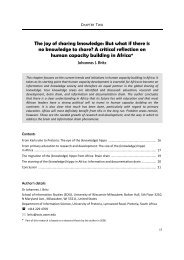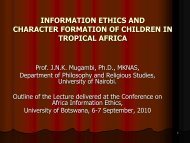Understand<strong>in</strong>g <strong>Information</strong> <strong>Ethics</strong>3. <strong>Information</strong> <strong>Ethics</strong><strong>Information</strong> <strong>Ethics</strong>, as applied ethics, is that field of study that <strong>in</strong>vestigates the ethical issues aris<strong>in</strong>gfrom the life cycle of <strong>in</strong>formation, <strong>in</strong>clud<strong>in</strong>g the generation, gather<strong>in</strong>g, organisation, retrieval,distribution and use of <strong>in</strong>formation. As an <strong>in</strong>terdiscipl<strong>in</strong>ary field of study it relates among others to thefields of computer science, library and <strong>in</strong>formation science, philosophy, communication science,journalism and mass media. The focus areas <strong>in</strong>clude the follow<strong>in</strong>g: the right to privacy, the right ofaccess to <strong>in</strong>formation, the right to <strong>in</strong>tellectual property and the quality of <strong>in</strong>formation.3.1. Historical development of <strong>Information</strong> <strong>Ethics</strong>Accord<strong>in</strong>g to Capurro (2006), the study of the historical development of <strong>Information</strong> <strong>Ethics</strong> with<strong>in</strong>different cultural traditions is still an open task. Not much is for example known of the development ofthis field <strong>in</strong> <strong>Africa</strong> and Asia. In this text the focus is on the development of <strong>Information</strong> <strong>Ethics</strong> <strong>in</strong> theWestern tradition. A few comments on recent developments <strong>in</strong> <strong>Africa</strong> will also be made.The Western tradition of <strong>Information</strong> <strong>Ethics</strong> is based on three core ideas, namely 1) freedom ofspeech, 2) freedom of access to <strong>in</strong>formation and 3) freedom of the press. Western <strong>Information</strong> <strong>Ethics</strong>can be traced back to the oral tradition of the ancient Greeks where freedom of speech and freedomof expression were highly valued <strong>in</strong> the agora (the market place). Plato, with the publication of hisdialogues, <strong>in</strong>troduced the transition from an oral to a written culture. Under the <strong>in</strong>fluence of theChristian tradition a true book culture was developed focus<strong>in</strong>g on the Bible and us<strong>in</strong>g Lat<strong>in</strong> as theofficial written language. Interpretation and communication of the text were limited to members of theclergy. Freedom of access to <strong>in</strong>formation and communication of ideas was therefore still ma<strong>in</strong>lyapplied <strong>in</strong> written form and limited to the religious leaders of the time. The <strong>in</strong>vention of the pr<strong>in</strong>t<strong>in</strong>gpress by Johannes Gutenberg <strong>in</strong> 1452 as well as the translation and distribution of the Bible <strong>in</strong>toGerman by among others Johannes Mentel<strong>in</strong> and the reformer Mart<strong>in</strong> Luther (1534) changed thissituation and <strong>in</strong>troduced the notion that everyone can have access to <strong>in</strong>formation as well as thefreedom to share ideas with others, not only <strong>in</strong> an oral but also <strong>in</strong> written and pr<strong>in</strong>ted forms. After theFrench revolution, libraries of the nobility and churches were made public and allowed more people toga<strong>in</strong> access to <strong>in</strong>formation and to share their ideas. This laid the cornerstone for what later becamethe pr<strong>in</strong>ciple of the freedom of the press.A direct consequence of the <strong>in</strong>vention of the pr<strong>in</strong>t<strong>in</strong>g press and subsequent widen<strong>in</strong>g of literacylevels of people <strong>in</strong> Europe was the <strong>in</strong>troduction of copyright <strong>in</strong> the 18 th century <strong>in</strong> Brita<strong>in</strong>. This wasma<strong>in</strong>ly <strong>in</strong> reaction to the monopolies held by pr<strong>in</strong>ters. Although <strong>in</strong>itially <strong>in</strong>vented to provide authorssome form of legal protection for their works for a short period of time, copyright soon expanded itsscope and application to become an <strong>in</strong>ternational legal concept, known as <strong>in</strong>tellectual property,regulat<strong>in</strong>g not only the creation of <strong>in</strong>formation products, but also the right of access to them andcopy<strong>in</strong>g and distribut<strong>in</strong>g them <strong>in</strong> almost all formats. The <strong>in</strong>troduction and development of <strong>in</strong>tellectualproperty rights have profoundly changed the very nature of freedom of access to <strong>in</strong>formation.The acceptance of the Universal Declaration of Human Rights (UDHR) by the United Nations(UN) <strong>in</strong> 1948 articulated these three core <strong>in</strong>formation pr<strong>in</strong>ciples as universal and basic human rightsfor the first time. It also lays down the groundwork for the role of communication <strong>in</strong> society as a whole.This is specifically true of Articles 18 and 19 deal<strong>in</strong>g with the right of freedom of thought, conscienceand religion (Art. 18) and the right to freedom of op<strong>in</strong>ion and expression (Art. 19) respectively. S<strong>in</strong>cethen, most democracies have embedded these pr<strong>in</strong>ciples <strong>in</strong>to their own constitutions and/orlegislation. S<strong>in</strong>ce the late 1960s the right to communicate has also become a central concern for theUN. This is the case with the purpose of expand<strong>in</strong>g the spheres of both freedom of expression andaccess to <strong>in</strong>formation by <strong>in</strong>clud<strong>in</strong>g the right to communicate as a basic human right. The focus of thisPage 3
J.J. Britzright is not only on the ability to communicate, but also to have access to communication media.Although efforts to add this right to the UDHR have been unsuccessful so far, the debate has ga<strong>in</strong>edmomentum at the two recent World Summits on the <strong>Information</strong> Society (WSIS) (2003, 2005).3.2. Brief overview of the development of an <strong>Africa</strong>n <strong>Information</strong> <strong>Ethics</strong><strong>Africa</strong>n <strong>Information</strong> <strong>Ethics</strong>, <strong>in</strong> other words, an ethical reflection by <strong>Africa</strong>ns on the <strong>in</strong>formation ethicalproblems fac<strong>in</strong>g <strong>Africa</strong>, is <strong>in</strong> many ways still <strong>in</strong> its <strong>in</strong>fancy. Not many <strong>Africa</strong>n philosophers reflect fromtheir philosophical traditions on these issues and <strong>Information</strong> <strong>Ethics</strong> does not form part of thecurriculum at most universities <strong>in</strong> <strong>Africa</strong>. Aggravat<strong>in</strong>g this problem is the fact that where <strong>Information</strong><strong>Ethics</strong> is taught, it is mostly done with<strong>in</strong> the traditional Western philosophical traditions. This problembecame even more apparent <strong>in</strong> October 2004 dur<strong>in</strong>g an <strong>in</strong>ternational symposium on <strong>Information</strong><strong>Ethics</strong> which was held <strong>in</strong> Karlsruhe, Germany. It was <strong>in</strong>itiated by Rafael Capurro and organised by theInternational Center for <strong>Information</strong> <strong>Ethics</strong> (ICIE). The sponsor was the Volkswagen Foundation <strong>in</strong>Germany. Lead<strong>in</strong>g <strong>in</strong>ternational experts <strong>in</strong> the field of <strong>Information</strong> <strong>Ethics</strong> were <strong>in</strong>vited to participateand it was a first of its k<strong>in</strong>d <strong>in</strong> the world. There were only a few <strong>Africa</strong>ns <strong>in</strong> attendance, most of themexpatriates. There were of course many reasons why the <strong>Africa</strong>n scholars were not present, somerelat<strong>in</strong>g to the mere fact that they are unknown to other <strong>in</strong>ternational scholars. Lack of fund<strong>in</strong>g toattend <strong>in</strong>ternational events was also a stumbl<strong>in</strong>g block, and last but not least, not much research hadbeen done on the <strong>Africa</strong>n cont<strong>in</strong>ent on this very important topic. It seems, <strong>in</strong> terms of philosophicalreflections and scholarly publications, that <strong>Africa</strong>n scholars did not have much to offer their globalcounterparts on the ethical challenges fac<strong>in</strong>g <strong>Africa</strong> <strong>in</strong> the era of globalisation.Evolv<strong>in</strong>g from this it became clear that there is an urgent need to <strong>in</strong>tegrate lead<strong>in</strong>g <strong>Africa</strong>nscholars <strong>in</strong>to the <strong>in</strong>ternational debate on the ethical issues fac<strong>in</strong>g <strong>Africa</strong> as part of the global<strong>in</strong>formation society. This led to the organisation of the first ever <strong>Africa</strong> <strong>Information</strong> <strong>Ethics</strong> conferencewhich was held <strong>in</strong> Pretoria, South <strong>Africa</strong>, <strong>in</strong> February 2007. Scholars from more than 21 countries,most of them from <strong>Africa</strong>, attended. The theme of the conference was very appropriate: ‘The joy ofshar<strong>in</strong>g knowledge’. The topics addressed at the conference <strong>in</strong>cluded the follow<strong>in</strong>g:• The digital divide• <strong>Information</strong> poverty• <strong>Information</strong> corruption• Access to <strong>in</strong>formation• Privacy• Intellectual property rights4. The impact of modern <strong>in</strong>formation and communication technologies onthe ethical discourseWhen discuss<strong>in</strong>g <strong>Information</strong> <strong>Ethics</strong>, it is important to reflect on the impact that modern <strong>in</strong>formationand communication technologies (ICT) have on the ethical debate. The development of modern ICT,and more particularly s<strong>in</strong>ce the 1960s, has not only profoundly changed the <strong>in</strong>formation andknowledge landscape, but as a result has also fundamentally impacted the global field of <strong>Information</strong><strong>Ethics</strong>.Preston def<strong>in</strong>es these new technologies as “[…] the cluster or <strong>in</strong>terrelated systems oftechnological <strong>in</strong>novations <strong>in</strong> the fields of microelectronics, comput<strong>in</strong>g, electronic communications<strong>in</strong>clud<strong>in</strong>g broadcast<strong>in</strong>g and the Internet” (2004:35) and <strong>in</strong>cludes the Internet, digital photography, cellphones and the World Wide Web. These technologies have radically changed our way of liv<strong>in</strong>g (atleast for people <strong>in</strong> the developed world) and the way <strong>in</strong> which we do th<strong>in</strong>gs. As such they are seen asubiquitous, <strong>in</strong>vad<strong>in</strong>g most facets of our existence. They have created a new and unprecedented formPage 4
- Page 1 and 2: Information Ethics in Africa: Cross
- Page 4: Information Ethics in Africa:Cross-
- Page 7 and 8: Page ii
- Page 9 and 10: Page iv
- Page 11 and 12: About the AuthorsDennis N. Ocholla
- Page 13: J.J. Britzmeaning of the ethical co
- Page 17 and 18: J.J. BritzFreeman, C. & Louca, F. (
- Page 19 and 20: R. Capurroprotection should be acco
- Page 21 and 22: R. Capurroindustrial and military a
- Page 23 and 24: R. Capurrocommon world instead of m
- Page 25 and 26: R. Capurroterminology (Wiredu, 1995
- Page 27 and 28: R. CapurroICT in Africa includes al
- Page 29 and 30: R. CapurroBuchmann, J. (Ed.) (2012)
- Page 31 and 32: R. CapurroRoosevelt, E. (1958). In
- Page 33 and 34: D.N. Ochollatheoretical views on th
- Page 35 and 36: D.N. Ochollaof GDP per capita are (
- Page 37 and 38: D.N. Ochollaassociate IK with tradi
- Page 39 and 40: D.N. Ochollafulfil the ideals as sp
- Page 41 and 42: S.M. MutulaBy definition, Informati
- Page 43 and 44: S.M. Mutulasurpassing countries in
- Page 45 and 46: S.M. MutulaThe University of Manito
- Page 47 and 48: S.M. Mutula8. Gaps in social media
- Page 49 and 50: S.M. Mutulaadhering to policies and
- Page 51 and 52: S.M. MutulaIt was found that cultur
- Page 53 and 54: S.M. MutulaVelasquez, M., Andre, C.
- Page 55 and 56: D. KawooyaLikewise, the laws and re
- Page 57 and 58: D. Kawooya107) but slowly making it
- Page 59 and 60: D. Kawooya4. IP in Africa and ethic
- Page 61 and 62: D. Kawooyawrongdoing because of the
- Page 63 and 64: D. Kawooyapractices. Countries that
- Page 65 and 66:
D. KawooyaOf course, at the core of
- Page 67 and 68:
D. Kawooyanumber of information acc
- Page 69 and 70:
Page 58
- Page 71 and 72:
S.M. Mutulaparties and civil societ
- Page 73 and 74:
S.M. Mutulaadoption of the principl
- Page 75 and 76:
S.M. Mutulaset of 17 barriers for e
- Page 77 and 78:
S.M. Mutulaavailing tender document
- Page 79 and 80:
S.M. MutulaReferencesAkther, M.S.,
- Page 81 and 82:
Page 70
- Page 83 and 84:
J.J. Britzalso to benefit from it t
- Page 85 and 86:
J.J. Britzthe public sphere, which
- Page 87 and 88:
J.J. Britzinfrastructure, developme
- Page 89 and 90:
J.J. Britz6.2. Qualitative indicato
- Page 91 and 92:
J.J. BritzSen, A. (1993). Capabilit
- Page 93 and 94:
IndexCapurro 1, 3, 4, 7, 11, 12, 21
- Page 95 and 96:
IndexFFacebook 30, 33fairness 2femi
- Page 97 and 98:
IndexITU World Telecommunication 27
- Page 99 and 100:
Indexrecognition algorithms 11recon
- Page 101:
IndexYYoruba 49YouTube 30ZZimbabwe






